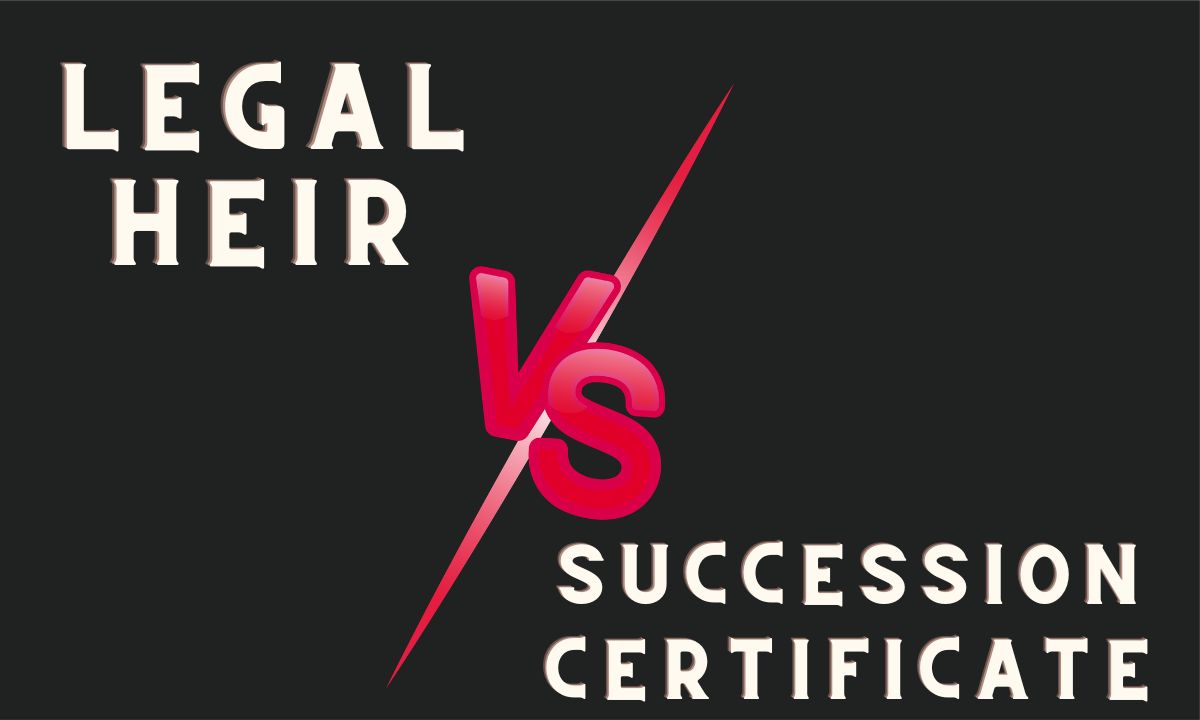Difference Between Legal Heir Certificate And Succession Certificate

Date : 30 Aug, 2023
Post By admin
When property ownership rights are granted without a clear indication of the property's true owner, disputes might result. Property given to an heir by a loved one passes to the new owner after completing the required documentation. The formalities are not complete without the necessary legal paperwork confirming the recipients as legitimate heirs or successors to the property.
They are based on formal wills or the deceased's own self-declaration of the property they want to transmit after death. If there is no valid will, the person wanting to inherit a deceased person's property in their name must get a lawful heir or succession certificate.
Legal Heir Certificate: An Overview
☑️ A legal heir certificate is required for everyone claiming to be a deceased person's legitimate heir.
☑️ There could be a sudden death in the family. To inherit the rights of the deceased in different schemes or investments created during his lifetime, or to which he was eligible if no nominee was nominated, legal heirs must get a legal heir certificate.
☑️ A legal heir certificate is required for the legal heirs to be able to claim any money, assets, property, insurance, retirement plans, gratuities, or other benefits held in the deceased person's name.
✔️ The following people must get a certificate of legal heirship:
☑️ Ancestors who have passed away
☑️ Bereaved husband or wife
☑️ Children of the survivors or the siblings of the deceased.
☑️ There could be a sudden death in the family. To inherit the rights of the deceased in different schemes or investments created during his lifetime, or to which he was eligible if no nominee was nominated, legal heirs must get a legal heir certificate.
☑️ A legal heir certificate is required for the legal heirs to be able to claim any money, assets, property, insurance, retirement plans, gratuities, or other benefits held in the deceased person's name.
✔️ The following people must get a certificate of legal heirship:
☑️ Ancestors who have passed away
☑️ Bereaved husband or wife
☑️ Children of the survivors or the siblings of the deceased.
Succession Certificate: An Overview
☑️ The competent court grants jurisdiction over all of the deceased individual's assets, liabilities, and rights to the person or group that has been acknowledged as the legal successor of the deceased.
☑️ The only definitive proof of a deceased person's successor is a Succession Certificate issued by the District Judge pursuant to Section 381 of the Indian Succession Act, 1925. Even after someone has died away, the court may intervene to assist in handling any outstanding obligations or assets. Without a will, the court identifies his legitimate heirs and certifies their inheritance to them. The heir not only acquires ownership of the Securities but also assumes liability for the debts of the Deceased, which the Successor shall pay in full.
☑️ It includes the names of the departed and their succeeding officials, as well as their respective addresses, other pertinent information, and data about their connections, such as how they were related.
☑️ You must fulfill the following conditions in order to be eligible for this certificate:
☑️ Those who assert to be the apparent heir to the late leader of the late leader's family.
☑️ Those who have been acknowledged by a court of law as successors.
☑️ The only definitive proof of a deceased person's successor is a Succession Certificate issued by the District Judge pursuant to Section 381 of the Indian Succession Act, 1925. Even after someone has died away, the court may intervene to assist in handling any outstanding obligations or assets. Without a will, the court identifies his legitimate heirs and certifies their inheritance to them. The heir not only acquires ownership of the Securities but also assumes liability for the debts of the Deceased, which the Successor shall pay in full.
☑️ It includes the names of the departed and their succeeding officials, as well as their respective addresses, other pertinent information, and data about their connections, such as how they were related.
☑️ You must fulfill the following conditions in order to be eligible for this certificate:
☑️ Those who assert to be the apparent heir to the late leader of the late leader's family.
☑️ Those who have been acknowledged by a court of law as successors.
Difference Between Legal Heir Certificate And Succession Certificate
A "Succession Certificate" and a "Legal Heir Certificate" are frequently used interchangeably. Although they seem to have the same purpose—protecting the rights and obligations of the deceased's heirs—from a legal standpoint, they are generally seen as separate. For the transfer of assets or eligibility to benefits titled to the decedent, a legal heir certificate is required. The succession certificate, on the other hand, is acceptable for the authorized successors claiming the decedent's movable and immovable property.
Conclusion
In India, the distribution of a decedent's assets is mostly based on the legal heir certificates and succession certificates. While succession certificates are used to prove entitlement to movable property, legal heir certificates are generally used to claim benefits and allowances. The goal of issuing these certificates is to guarantee a seamless and legal distribution of assets among the legitimate heirs. For correct advice, it is advisable to speak with legal experts who are familiar with the policies and procedures in the Indian state in which you are doing business.





